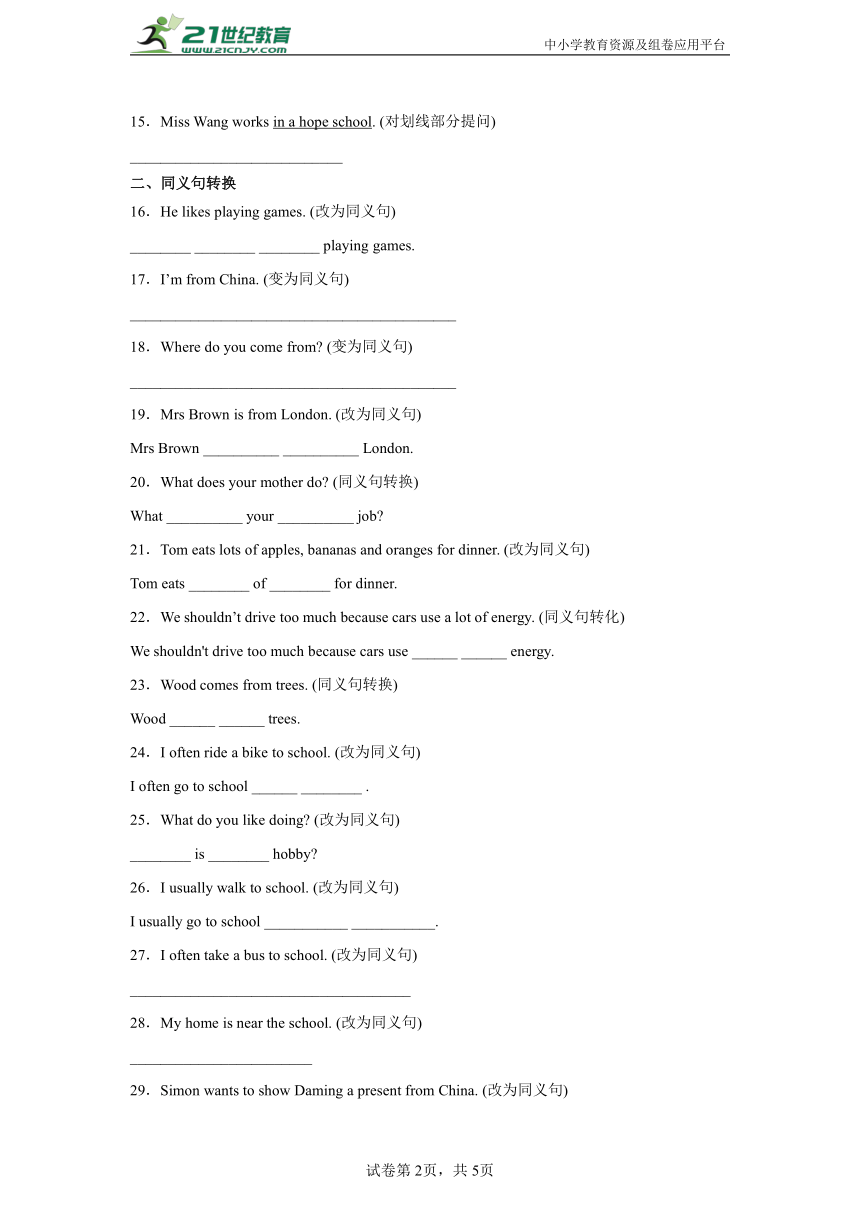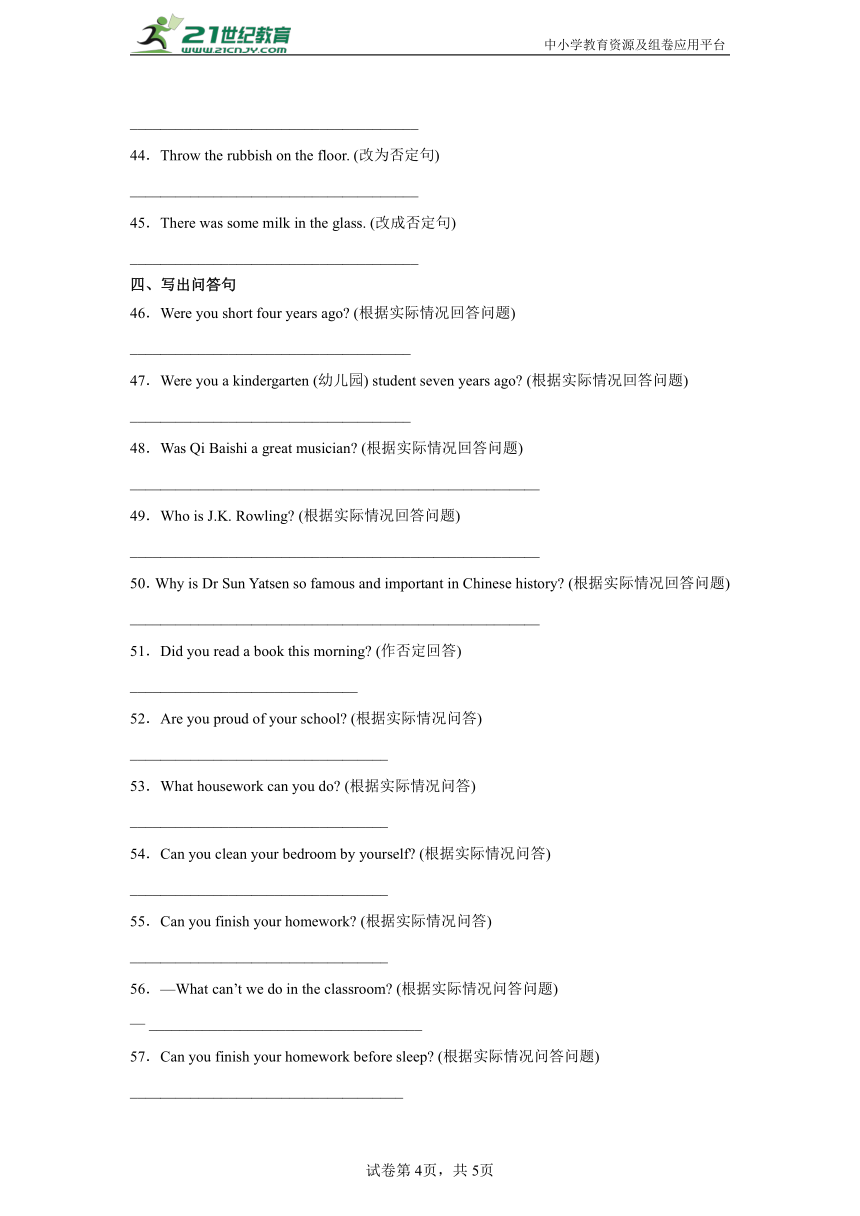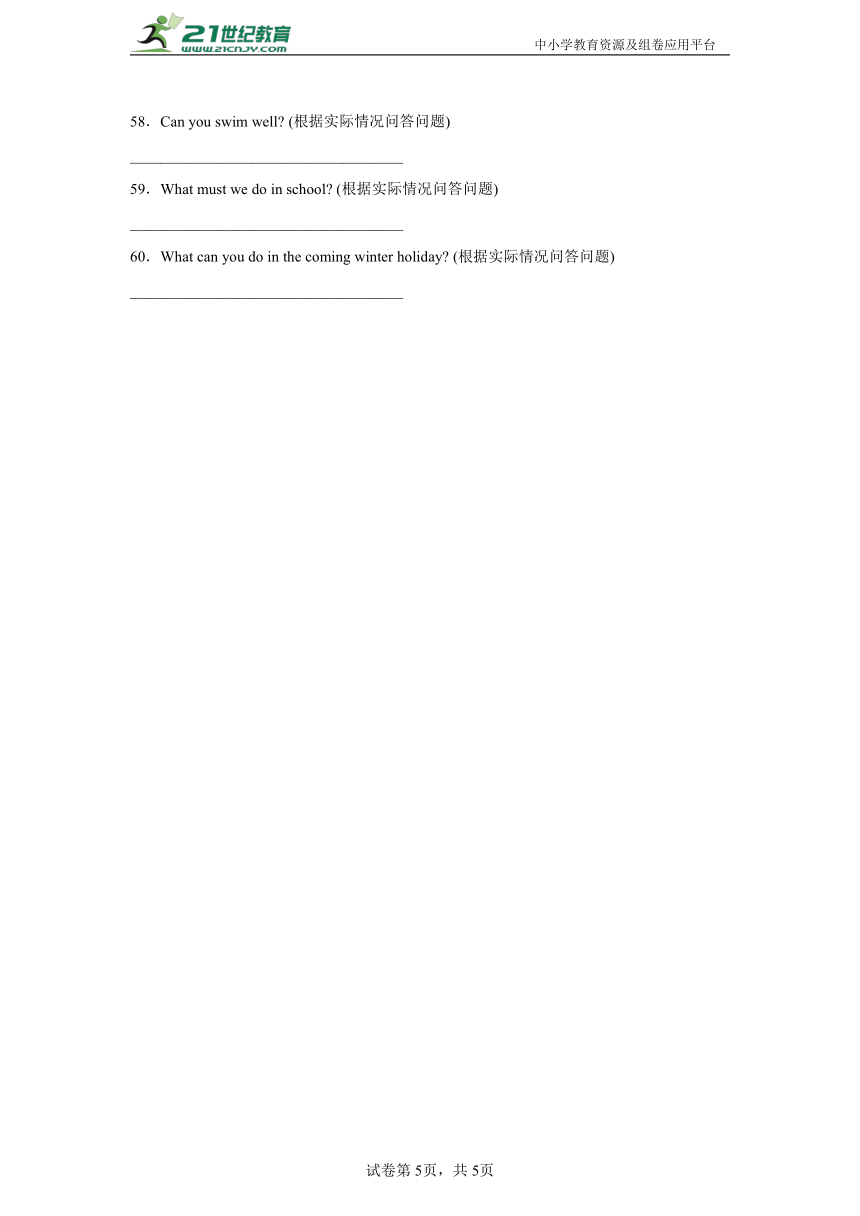小升初重点专题特训:句型转换-小学英语六年级下册人教PEP版
文档属性
| 名称 | 小升初重点专题特训:句型转换-小学英语六年级下册人教PEP版 |  | |
| 格式 | docx | ||
| 文件大小 | 137.6KB | ||
| 资源类型 | 试卷 | ||
| 版本资源 | 人教版(PEP) | ||
| 科目 | 英语 | ||
| 更新时间 | 2023-06-06 17:37:05 | ||
图片预览





文档简介
小升初重点专题特训:句型转换英语六年级下册人教PEP版
一、对划线部分提问
1.People like to go out in spring because it’s warm. (对画线部分提问)
______________________________
2.We eat lots of food. (对画线部分提问)
____________________________________________________________
3.We’re going to visit Hangzhou by ship. (对画线部分提问)
________ ________ you going to visit Hangzhou
4.My birthday is on July 2nd. (对划线部分提问)
____________ ____________ your birthday
5.His hobby is collecting maps. (对画线部分提问)
_____ _____ his hobby
6.We will go to Jinan next year. (对画线部分提问)
______ ______ you go to Jinan
7.It takes some hours to get there. (对划线部分提问)
____________________________________________________
8.The bike is twenty-five yuan. (对画线部分提问)
________ is the bike
9.We went there by plane. (对划线部分提问)
How _______ you _______ there
10.Sarah goes to school by bike every day. (划线提问)
_____ _____ Sarah go to school every day
11.They’re going to the USA next Tuesday. (划线提问)
_____ _____ they going to the USA
12.It is red. (对画线部分提问)
____________________________________
13.I want to go to Shanghai. (对画线部分提问)
________________________________________
14.Riding a bike is my hobby. (对画线部分提问)
______________________________________
15.Miss Wang works in a hope school. (对划线部分提问)
____________________________
二、同义句转换
16.He likes playing games. (改为同义句)
________ ________ ________ playing games.
17.I’m from China. (变为同义句)
___________________________________________
18.Where do you come from (变为同义句)
___________________________________________
19.Mrs Brown is from London. (改为同义句)
Mrs Brown __________ __________ London.
20.What does your mother do (同义句转换)
What __________ your __________ job
21.Tom eats lots of apples, bananas and oranges for dinner. (改为同义句)
Tom eats ________ of ________ for dinner.
22.We shouldn’t drive too much because cars use a lot of energy. (同义句转化)
We shouldn't drive too much because cars use ______ ______ energy.
23.Wood comes from trees. (同义句转换)
Wood ______ ______ trees.
24.I often ride a bike to school. (改为同义句)
I often go to school ______ ________ .
25.What do you like doing (改为同义句)
________ is ________ hobby
26.I usually walk to school. (改为同义句)
I usually go to school ___________ ___________.
27.I often take a bus to school. (改为同义句)
_____________________________________
28.My home is near the school. (改为同义句)
________________________
29.Simon wants to show Daming a present from China. (改为同义句)
_______________________________________________
30.Pleased to meet you. (改为同义句)
N _____ _____ _____ _____.
三、改写句子
31.I went shopping last Sunday. (改为一般疑问句)
_______________________________
32.We like them. (改为否定句)
_________________________
33.I drank some milk last night. (改为否定句)
________________________________
34.She went home on foot. (改为否定句)
________________________________
35.They played basketball last Sunday. (用next Sunday改写句子)
_____________________________________
36.I learn English every day. (改为现在进行时)
I am _____ English now.
37.You should go home. (改为否定句)
___________________________________
38.Mike is playing computer games now. (用every evening改写句子)
______________________________________
39.We shouldn’t put the rubbish in the street. (改为祈使句)
_______ _______ the rubbish in the street.
40.I went boating last Friday. (改为一般疑问句)
______ ______ ______ boating last Friday
41.—How can we keep our classroom clean
—We can put rubbish in the bin. (合并为一句)
We can put rubbish in the bin _______ _______ our classroom clean.
42.This fish in the water was dead. (改为复数句)
_______ _______ in the water _______ dead.
43.The fish are dead. (改为一般疑问句)
______________________________________
44.Throw the rubbish on the floor. (改为否定句)
______________________________________
45.There was some milk in the glass. (改成否定句)
______________________________________
四、写出问答句
46.Were you short four years ago (根据实际情况回答问题)
_____________________________________
47.Were you a kindergarten (幼儿园) student seven years ago (根据实际情况回答问题)
_____________________________________
48.Was Qi Baishi a great musician (根据实际情况回答问题)
______________________________________________________
49.Who is J.K. Rowling (根据实际情况回答问题)
______________________________________________________
50.Why is Dr Sun Yatsen so famous and important in Chinese history (根据实际情况回答问题)
______________________________________________________
51.Did you read a book this morning (作否定回答)
______________________________
52.Are you proud of your school (根据实际情况问答)
__________________________________
53.What housework can you do (根据实际情况问答)
__________________________________
54.Can you clean your bedroom by yourself (根据实际情况问答)
__________________________________
55.Can you finish your homework (根据实际情况问答)
__________________________________
56.—What can’t we do in the classroom (根据实际情况问答问题)
— ____________________________________
57.Can you finish your homework before sleep (根据实际情况问答问题)
____________________________________
58.Can you swim well (根据实际情况问答问题)
____________________________________
59.What must we do in school (根据实际情况问答问题)
____________________________________
60.What can you do in the coming winter holiday (根据实际情况问答问题)
____________________________________
中小学教育资源及组卷应用平台
中小学教育资源及组卷应用平台
试卷第4页,共5页
试卷第5页,共5页
参考答案:
1.Why do people like to go out in spring
【详解】原句句意:人们喜欢在春天出去,因为天气暖和。本题考查特殊疑问句,画线部分是because it’s warm,用why提问,问句结构为:Why+助动词+主语+动词原形+其他?主语people是复数人称,句子是一般现在时,助动词用do,后面动词用原形。故答案为Why do people like to go out in spring
2.What do you do
【详解】原句句意:我们吃很多食物。本题考查特殊疑问句,画线部分是做的事情,用what提问,问句句意为:你们做什么?问句结构为:What+助动词+主语+动词原形?主语we变you,助动词用do,做do,故答案为What do you do
3. How are
【详解】原句句意:我们打算坐船去杭州。本题考查特殊疑问句。划线部分是交通方式,用How提问,主语是you,be动词用are,故答案为How;are。
4. When is
【详解】原句句意:我的生日是七月二日。本题考查特殊疑问句。划线部分是时间,用When提问,谓语动词是is,故答案为When;is。
5. What is
【详解】原句句意:他的爱好是收集地图。本题考查特殊疑问句,画线部分是爱好,用what提问,问句句意为:他的爱好是什么?what后跟is引导的一般疑问句,故答案为What,is。
6. When will
【详解】原句句意:我们打算明年去济南。本题考查特殊疑问句,画线部分是next year,用when提问,后跟一般疑问句。故答案为When;will。
7.How long does it take to get there
【详解】原句句意:到那里需要几个小时。本题考查特殊疑问句,划线部分是时间,用how long提问,问句句意为:到那里需要多长时间?问句结构为:How long+助动词+主语+动词原形+其他?主语it是第三人称单数,助动词用does,takes的原形是take,故答案为How long does it take to get there
8.How much
【详解】原句句意:这辆自行车是二十五元。本题考查句型转化,画线部分是价格,用疑问词组How much提问,故答案为How much。
9. did go
【详解】句意:我们坐飞机去那。本题考查特殊疑问句,划线部分是交通方式,用疑问词how提问,原句中谓语动词是went,句子是一般过去时,助动词用did,went改为动词原形,句子是How did you go there 故答案为did;go。
10. How does
【详解】原句句意:萨拉每天骑自行车上学。本题考查句型转换。划线部分是交通方式,用how提问,句子含实义动词goes,问句借助助动词does,故答案为How;does。
11. When are
【详解】原句句意:他们下周二要去美国。本题考查特殊疑问句。划线部分是时间,用When提问,后面跟are引导的一般疑问句,故答案为When,are。
12.What colour is it
【详解】原句句意:它是红色的。本题考查特殊疑问句,画线部分是颜色,用what colour提问,后面跟is引导的一般疑问句,故答案为What colour is it
13.Where do you want to go
【详解】原句句意:我想要去上海。本题考查特殊疑问句,画线部分是Shanghai,用where提问,问句结构为:Where+助动词+主语+动词原形+其他?主语you是第二人称单数,句子是一般现在时,助动词用do,后跟动词原形,故答案为Where do you want to go
14.What’s your hobby /What is your hobby
【详解】原句句意:骑自行车是我的爱好。本题考查特殊疑问句,画线部分是爱好,用what提问,后面跟is引导的一般疑问句,问句为:你的爱好是什么?故答案为What’s your hobby /What is your hobby
15.Where does Miss Wang work
【详解】句意:王小姐在一所希望学校工作。本题考查句型转换,对划线部分提问用疑问词where,句子含有实义动词works,时态是一般现在时,变疑问句借助助动词does,故答案为Where does Miss Wang work
16. His hobby is
【详解】原句句意:他喜欢玩游戏。同义句可为:他的爱好是玩游戏。他的his,爱好hobby,是is,故答案为His,hobby,is。
17.I come from China.
【详解】句意:我来自中国。变为同义句,be from=come from来自,故答案为I come from China.
【点睛】
18.Where are you from
【详解】句意:你来自哪里?变为同义句,come from=be from,主语是you,系动词用are,故答案为Where are you from
【点睛】
19. comes from
【详解】句意为布朗夫人来自伦敦,题意要求改为同义句,be from=come from,意为来自于,该句时态为一般现在时,主语Mrs Brown为单数第三人称,谓语动词应该用come的单三形式comes,故答案为comes;from。
20. is mother's
【详解】句意:你妈妈是做什么的?同义句可以换成:你妈妈的工作是什么?What is your mother's job 故答案为is;mother's。
21. lots fruits
【详解】句意:Tom晚饭吃了很多苹果,香蕉,橙子。所以同义句是Tom吃了很多水果。故答案为lots;fruits。
22. lots of
【详解】句意:我们不能开很多的车,因为汽车用很多的能源。a lot of=lots of,故答案为lots;of。
23. is from
【详解】句意:木头来自于树。来自于……可以用be from/come from,主语wood是第三人称单数,be用is,故答案为is;from。
24. by bike
【解析】略
25. What your
【详解】句意:你喜欢做什么?其同义句为你的爱好是什么?句子结构为What+be+sb's hobby 故答案为What,your。
【点睛】
26. on foot
【详解】原句句意:我通常步行上学。walk to+地点可以替换成go to+地点+on foot,故答案为on;foot。
27.I often go to school by bus.
【详解】原句句意:我经常坐公交车去上学。改为同义句,坐公交车也可以用介词短语by bus,去学校是动词短语go to school,故答案为I often go to school by bus.
【点睛】
28.My home is next to the school.
【详解】句意:我家在学校附近。改为同义句,near在……附近,可以替换成next to,故答案为My home is next to the school.
29.Simon wants to show a present from China to Daming.
【详解】句意:西蒙想给大明展示一件来自中国的礼物。给某人展示某物,show sb sth=show sth to sb。原句中的show Daming a present from China可以替换为Show a present from China to Daming。故答案为Simon wants to show a present from China to Daming.
【点睛】
30. Nice/ice to meet you
【详解】原句句意:很高兴见到你。pleased可以改成nice,故答案为Nice;to;meet;you。
31.Did you go shopping last Sunday
【详解】句意:我上周日去购物了。本题考查句型转换,句子是一般过去时,改为一般疑问句,句首助动词用Did,第一人称I改为第二人称you,went改为动词原形,故答案为Did you go shopping last Sunday
32.We don’t like them.
【详解】原句句意:我们喜欢他们。本题考查句型转换,like是实义动词,主语we是复数,改为否定句需加助动词don’t,后跟动词原形。故答案为We don’t like them.
33.I didn’t drink any milk last night.
【详解】原句句意:我昨天晚上喝了一些牛奶。本题考查句型转换,原句是一般过去时,改为否定句需要借助于助动词did的否定形式didn’t,后面的动词drank需要改为原形drink,some用于肯定句,any用于否定句,改为否定句需要把some改为any,其他不变,故答案为I didn’t drink any milk last night.
34.She didn’t go home on foot.
【详解】句意:她步行回家。本题考查句型转换。这是一般过去时的句子,变否定句,借助于助动词didn’t来变,主语+didn’t+动词原形+其他,went的原形是go,故答案为She didn’t go home on foot.
35.They will play basketball next Sunday.
【详解】原句句意:他们上周日打篮球了。本题考查句型转换,用next Sunday改写句子,即将原句改为一般将来时,will do结构,将played改为will play,将last Sunday改为next Sunday。故答案为They will play basketball next Sunday.
36.learning
【详解】句意:我每天学习英语。本题考查句子结构。现在进行时态的构成是:主语+be+动词的现在分词+其它,learn的现在分词是learning,故答案为learning。
37.You shouldn’t go home.
【详解】原句句意:你/你们应该回家。本题考查句型转换,原句中should是情态动词,改为否定句把should改为其否定形式shouldn’t,其他不变,故答案为You shouldn’t go home.
38.Mike plays computer games every evening.
【详解】句意:迈克现在正在玩电脑游戏。本题考查句型转换,用every evening改写句子,也就是把句子改为一般现在时,主语Mike是第三人称单数,谓语动词用第三人称单数形式plays,故答案为Mike plays computer games every evening.
39. Don’t put
【详解】原句句意:我们不应该把垃圾扔在街上。本题考查句型转换。改为祈使句可以用Don’t+动词原形的结构,故答案为Don’t;put。
40. Did you go
【详解】原句句意:我上周五去划船了。本题考查句型转换,原句是一般过去时,改为一般疑问句,助动词用did,I变you,went变原形go,故答案为Did,you,go。
41. to keep
【详解】原句句意:—我们如何保持教室清洁?—我们可以把垃圾放进垃圾箱。本题考查句型转换。题干要求合并为一句,合并后句子为:我们可以把垃圾放进垃圾箱以保持教室的清洁。所以“我们可以把垃圾放进垃圾箱”的目的是“保持教室的清洁”,用动词不定式表目的,to keep以保持,故答案为to;keep。
42. These fish were
【详解】句意:水里的鱼死了。本题考查句型转换,this的复数形式these,且首字母大写,fish的复数形式fish,单复同形,was的复数形式were,故答案为These;fish;were。
43.Are the fish dead
【详解】原句句意:鱼死了。本题考查句型转换,含有be动词的陈述句改为一般疑问句,把are提前,故答案为Are the fish dead
44.Don’t throw the rubbish on the floor.
【详解】句意:把垃圾扔在地板上。本题考查句型转换,句子是祈使句,改为否定句在句首加Don’t,故答案为Don’t throw the rubbish on the floor.
45.There wasn’t any milk in the glass.
【详解】句意:玻璃杯里有一些牛奶。句子为there be句型,改为否定句,在be动词was后面加not,was not可以缩写为wasn’t。肯定句中的some,在否定句中要变成any。故答案为There wasn’t any milk in the glass.
46.Yes, I was.(答案不唯一)
【详解】句意:四年前你矮吗?该句是由系动词Were引导的一般疑问句,根据实际情况回答,可做肯定回答,Yes, 主语+系动词. 主语由第二人称you改为第一人称I,系动词用was,故答案为Yes, I was.(答案不唯一)
47.Yes, I was. (答案不唯一)
【详解】句意:七年前你是幼儿园的学生吗?该句是由系动词Were引导的一般疑问句,根据实际情况回答,答案不唯一,如做肯定回答,Yes, 主语+系动词. 第二人称you改为第一人称I,系动词用was,故答案为Yes, I was. (答案不唯一)
48.如:No, he wasn’t.
【详解】句意:齐白石是一名伟大的音乐家吗?根据实际情况回答,齐白石不是音乐家,所以该题应该做否定回答,故答案为No, he wasn’t.
49.She is a writer. (仅供参考)
【详解】句意:J.K.罗琳是谁?根据实际情况可知J.K.罗琳是英国女作家。故回答她是一个作家。作家用writer,故答案为She is a writer.
50.Because he tried to free the Chinese people and make their lives better. (仅供参考)
【详解】句意:为什么孙中山在中国历史上如此著名和重要?句子问的是原因,所以用because来回答,答案不唯一,故答案为Because he tried to free the Chinese people and make their lives better. (仅供参考)
51.No, I didn’t.
【详解】句意:今天早上你读书了吗?did引导的一般疑问句,主语是you,肯定回答为Yes, I(we) did. 否定回答为No, I(we) didn't. 该句要求做否定回答,答案不唯一。故答案为No, I didn’t.
52.Yes, I am.
【详解】句意:你为你的学校感到骄傲吗?这是be动词are引导的一般疑问句,问句主语是you,答句主语可以是I,肯定回答Yes, I am.
53.I can sweep the floor and wash the clothes.
【详解】问句句意:你会做什么家务?回答可以是我会扫地和洗衣服。肯定句式:主语+can+动词原形+其它。扫地用sweep the floor,洗衣服用wash the clothes,故答案为I can sweep the floor and wash the clothes.
54.Yes, I can.
【详解】问句句意:你能自己打扫你的卧室吗?要求根据实际情况问答,本题答案不唯一,可以回答Yes, I can.是的,我能。故答案为Yes, I can.
55.Yes, I can.
【详解】句意:你能完成你的家庭作业吗?can引导的一般疑问句,问句主语是you,答句主语可以是I,肯定回答Yes, I can.故答案为Yes, I can.
56.We can’t talk loudly.
【详解】句意:我们不能在教室里做什么?举例:我们不能在教室里大声交谈。故答案为:We can’t talk loudly.
57.Yes, I can.
【详解】原句句意:你能在睡觉前完成你的家庭作业吗?can引导的一般疑问句,主语是you,肯定回答为Yes, I(we) can. 否定回答为No, I(we) can't. 根据实际情况回答,答案不唯一,如:是的,我能。故答案为Yes, I can.
58.Yes, I can.
【详解】原句句意:你游泳游得好吗?can引导的一般疑问句,主语是you,肯定回答为Yes, I(we) can. 否定回答为No, I(we) can't.根据实际情况回答,答案不唯一,如:是的,我能。故答案为Yes, I can.
59.如:We must follow the rules.
【详解】句意:在学校里我们必须做什么?举例:我们必须遵守校规。遵守校规follow the rules,答案不唯一,故答案为We must follow the rules.
60.I can go for a trip.
【详解】原句句意:你在即将到来的寒假能做什么?根据实际情况回答,答案不唯一,如:我可以去旅行。故答案为I can go for a trip.
答案第4页,共8页
答案第1页,共8页
一、对划线部分提问
1.People like to go out in spring because it’s warm. (对画线部分提问)
______________________________
2.We eat lots of food. (对画线部分提问)
____________________________________________________________
3.We’re going to visit Hangzhou by ship. (对画线部分提问)
________ ________ you going to visit Hangzhou
4.My birthday is on July 2nd. (对划线部分提问)
____________ ____________ your birthday
5.His hobby is collecting maps. (对画线部分提问)
_____ _____ his hobby
6.We will go to Jinan next year. (对画线部分提问)
______ ______ you go to Jinan
7.It takes some hours to get there. (对划线部分提问)
____________________________________________________
8.The bike is twenty-five yuan. (对画线部分提问)
________ is the bike
9.We went there by plane. (对划线部分提问)
How _______ you _______ there
10.Sarah goes to school by bike every day. (划线提问)
_____ _____ Sarah go to school every day
11.They’re going to the USA next Tuesday. (划线提问)
_____ _____ they going to the USA
12.It is red. (对画线部分提问)
____________________________________
13.I want to go to Shanghai. (对画线部分提问)
________________________________________
14.Riding a bike is my hobby. (对画线部分提问)
______________________________________
15.Miss Wang works in a hope school. (对划线部分提问)
____________________________
二、同义句转换
16.He likes playing games. (改为同义句)
________ ________ ________ playing games.
17.I’m from China. (变为同义句)
___________________________________________
18.Where do you come from (变为同义句)
___________________________________________
19.Mrs Brown is from London. (改为同义句)
Mrs Brown __________ __________ London.
20.What does your mother do (同义句转换)
What __________ your __________ job
21.Tom eats lots of apples, bananas and oranges for dinner. (改为同义句)
Tom eats ________ of ________ for dinner.
22.We shouldn’t drive too much because cars use a lot of energy. (同义句转化)
We shouldn't drive too much because cars use ______ ______ energy.
23.Wood comes from trees. (同义句转换)
Wood ______ ______ trees.
24.I often ride a bike to school. (改为同义句)
I often go to school ______ ________ .
25.What do you like doing (改为同义句)
________ is ________ hobby
26.I usually walk to school. (改为同义句)
I usually go to school ___________ ___________.
27.I often take a bus to school. (改为同义句)
_____________________________________
28.My home is near the school. (改为同义句)
________________________
29.Simon wants to show Daming a present from China. (改为同义句)
_______________________________________________
30.Pleased to meet you. (改为同义句)
N _____ _____ _____ _____.
三、改写句子
31.I went shopping last Sunday. (改为一般疑问句)
_______________________________
32.We like them. (改为否定句)
_________________________
33.I drank some milk last night. (改为否定句)
________________________________
34.She went home on foot. (改为否定句)
________________________________
35.They played basketball last Sunday. (用next Sunday改写句子)
_____________________________________
36.I learn English every day. (改为现在进行时)
I am _____ English now.
37.You should go home. (改为否定句)
___________________________________
38.Mike is playing computer games now. (用every evening改写句子)
______________________________________
39.We shouldn’t put the rubbish in the street. (改为祈使句)
_______ _______ the rubbish in the street.
40.I went boating last Friday. (改为一般疑问句)
______ ______ ______ boating last Friday
41.—How can we keep our classroom clean
—We can put rubbish in the bin. (合并为一句)
We can put rubbish in the bin _______ _______ our classroom clean.
42.This fish in the water was dead. (改为复数句)
_______ _______ in the water _______ dead.
43.The fish are dead. (改为一般疑问句)
______________________________________
44.Throw the rubbish on the floor. (改为否定句)
______________________________________
45.There was some milk in the glass. (改成否定句)
______________________________________
四、写出问答句
46.Were you short four years ago (根据实际情况回答问题)
_____________________________________
47.Were you a kindergarten (幼儿园) student seven years ago (根据实际情况回答问题)
_____________________________________
48.Was Qi Baishi a great musician (根据实际情况回答问题)
______________________________________________________
49.Who is J.K. Rowling (根据实际情况回答问题)
______________________________________________________
50.Why is Dr Sun Yatsen so famous and important in Chinese history (根据实际情况回答问题)
______________________________________________________
51.Did you read a book this morning (作否定回答)
______________________________
52.Are you proud of your school (根据实际情况问答)
__________________________________
53.What housework can you do (根据实际情况问答)
__________________________________
54.Can you clean your bedroom by yourself (根据实际情况问答)
__________________________________
55.Can you finish your homework (根据实际情况问答)
__________________________________
56.—What can’t we do in the classroom (根据实际情况问答问题)
— ____________________________________
57.Can you finish your homework before sleep (根据实际情况问答问题)
____________________________________
58.Can you swim well (根据实际情况问答问题)
____________________________________
59.What must we do in school (根据实际情况问答问题)
____________________________________
60.What can you do in the coming winter holiday (根据实际情况问答问题)
____________________________________
中小学教育资源及组卷应用平台
中小学教育资源及组卷应用平台
试卷第4页,共5页
试卷第5页,共5页
参考答案:
1.Why do people like to go out in spring
【详解】原句句意:人们喜欢在春天出去,因为天气暖和。本题考查特殊疑问句,画线部分是because it’s warm,用why提问,问句结构为:Why+助动词+主语+动词原形+其他?主语people是复数人称,句子是一般现在时,助动词用do,后面动词用原形。故答案为Why do people like to go out in spring
2.What do you do
【详解】原句句意:我们吃很多食物。本题考查特殊疑问句,画线部分是做的事情,用what提问,问句句意为:你们做什么?问句结构为:What+助动词+主语+动词原形?主语we变you,助动词用do,做do,故答案为What do you do
3. How are
【详解】原句句意:我们打算坐船去杭州。本题考查特殊疑问句。划线部分是交通方式,用How提问,主语是you,be动词用are,故答案为How;are。
4. When is
【详解】原句句意:我的生日是七月二日。本题考查特殊疑问句。划线部分是时间,用When提问,谓语动词是is,故答案为When;is。
5. What is
【详解】原句句意:他的爱好是收集地图。本题考查特殊疑问句,画线部分是爱好,用what提问,问句句意为:他的爱好是什么?what后跟is引导的一般疑问句,故答案为What,is。
6. When will
【详解】原句句意:我们打算明年去济南。本题考查特殊疑问句,画线部分是next year,用when提问,后跟一般疑问句。故答案为When;will。
7.How long does it take to get there
【详解】原句句意:到那里需要几个小时。本题考查特殊疑问句,划线部分是时间,用how long提问,问句句意为:到那里需要多长时间?问句结构为:How long+助动词+主语+动词原形+其他?主语it是第三人称单数,助动词用does,takes的原形是take,故答案为How long does it take to get there
8.How much
【详解】原句句意:这辆自行车是二十五元。本题考查句型转化,画线部分是价格,用疑问词组How much提问,故答案为How much。
9. did go
【详解】句意:我们坐飞机去那。本题考查特殊疑问句,划线部分是交通方式,用疑问词how提问,原句中谓语动词是went,句子是一般过去时,助动词用did,went改为动词原形,句子是How did you go there 故答案为did;go。
10. How does
【详解】原句句意:萨拉每天骑自行车上学。本题考查句型转换。划线部分是交通方式,用how提问,句子含实义动词goes,问句借助助动词does,故答案为How;does。
11. When are
【详解】原句句意:他们下周二要去美国。本题考查特殊疑问句。划线部分是时间,用When提问,后面跟are引导的一般疑问句,故答案为When,are。
12.What colour is it
【详解】原句句意:它是红色的。本题考查特殊疑问句,画线部分是颜色,用what colour提问,后面跟is引导的一般疑问句,故答案为What colour is it
13.Where do you want to go
【详解】原句句意:我想要去上海。本题考查特殊疑问句,画线部分是Shanghai,用where提问,问句结构为:Where+助动词+主语+动词原形+其他?主语you是第二人称单数,句子是一般现在时,助动词用do,后跟动词原形,故答案为Where do you want to go
14.What’s your hobby /What is your hobby
【详解】原句句意:骑自行车是我的爱好。本题考查特殊疑问句,画线部分是爱好,用what提问,后面跟is引导的一般疑问句,问句为:你的爱好是什么?故答案为What’s your hobby /What is your hobby
15.Where does Miss Wang work
【详解】句意:王小姐在一所希望学校工作。本题考查句型转换,对划线部分提问用疑问词where,句子含有实义动词works,时态是一般现在时,变疑问句借助助动词does,故答案为Where does Miss Wang work
16. His hobby is
【详解】原句句意:他喜欢玩游戏。同义句可为:他的爱好是玩游戏。他的his,爱好hobby,是is,故答案为His,hobby,is。
17.I come from China.
【详解】句意:我来自中国。变为同义句,be from=come from来自,故答案为I come from China.
【点睛】
18.Where are you from
【详解】句意:你来自哪里?变为同义句,come from=be from,主语是you,系动词用are,故答案为Where are you from
【点睛】
19. comes from
【详解】句意为布朗夫人来自伦敦,题意要求改为同义句,be from=come from,意为来自于,该句时态为一般现在时,主语Mrs Brown为单数第三人称,谓语动词应该用come的单三形式comes,故答案为comes;from。
20. is mother's
【详解】句意:你妈妈是做什么的?同义句可以换成:你妈妈的工作是什么?What is your mother's job 故答案为is;mother's。
21. lots fruits
【详解】句意:Tom晚饭吃了很多苹果,香蕉,橙子。所以同义句是Tom吃了很多水果。故答案为lots;fruits。
22. lots of
【详解】句意:我们不能开很多的车,因为汽车用很多的能源。a lot of=lots of,故答案为lots;of。
23. is from
【详解】句意:木头来自于树。来自于……可以用be from/come from,主语wood是第三人称单数,be用is,故答案为is;from。
24. by bike
【解析】略
25. What your
【详解】句意:你喜欢做什么?其同义句为你的爱好是什么?句子结构为What+be+sb's hobby 故答案为What,your。
【点睛】
26. on foot
【详解】原句句意:我通常步行上学。walk to+地点可以替换成go to+地点+on foot,故答案为on;foot。
27.I often go to school by bus.
【详解】原句句意:我经常坐公交车去上学。改为同义句,坐公交车也可以用介词短语by bus,去学校是动词短语go to school,故答案为I often go to school by bus.
【点睛】
28.My home is next to the school.
【详解】句意:我家在学校附近。改为同义句,near在……附近,可以替换成next to,故答案为My home is next to the school.
29.Simon wants to show a present from China to Daming.
【详解】句意:西蒙想给大明展示一件来自中国的礼物。给某人展示某物,show sb sth=show sth to sb。原句中的show Daming a present from China可以替换为Show a present from China to Daming。故答案为Simon wants to show a present from China to Daming.
【点睛】
30. Nice/ice to meet you
【详解】原句句意:很高兴见到你。pleased可以改成nice,故答案为Nice;to;meet;you。
31.Did you go shopping last Sunday
【详解】句意:我上周日去购物了。本题考查句型转换,句子是一般过去时,改为一般疑问句,句首助动词用Did,第一人称I改为第二人称you,went改为动词原形,故答案为Did you go shopping last Sunday
32.We don’t like them.
【详解】原句句意:我们喜欢他们。本题考查句型转换,like是实义动词,主语we是复数,改为否定句需加助动词don’t,后跟动词原形。故答案为We don’t like them.
33.I didn’t drink any milk last night.
【详解】原句句意:我昨天晚上喝了一些牛奶。本题考查句型转换,原句是一般过去时,改为否定句需要借助于助动词did的否定形式didn’t,后面的动词drank需要改为原形drink,some用于肯定句,any用于否定句,改为否定句需要把some改为any,其他不变,故答案为I didn’t drink any milk last night.
34.She didn’t go home on foot.
【详解】句意:她步行回家。本题考查句型转换。这是一般过去时的句子,变否定句,借助于助动词didn’t来变,主语+didn’t+动词原形+其他,went的原形是go,故答案为She didn’t go home on foot.
35.They will play basketball next Sunday.
【详解】原句句意:他们上周日打篮球了。本题考查句型转换,用next Sunday改写句子,即将原句改为一般将来时,will do结构,将played改为will play,将last Sunday改为next Sunday。故答案为They will play basketball next Sunday.
36.learning
【详解】句意:我每天学习英语。本题考查句子结构。现在进行时态的构成是:主语+be+动词的现在分词+其它,learn的现在分词是learning,故答案为learning。
37.You shouldn’t go home.
【详解】原句句意:你/你们应该回家。本题考查句型转换,原句中should是情态动词,改为否定句把should改为其否定形式shouldn’t,其他不变,故答案为You shouldn’t go home.
38.Mike plays computer games every evening.
【详解】句意:迈克现在正在玩电脑游戏。本题考查句型转换,用every evening改写句子,也就是把句子改为一般现在时,主语Mike是第三人称单数,谓语动词用第三人称单数形式plays,故答案为Mike plays computer games every evening.
39. Don’t put
【详解】原句句意:我们不应该把垃圾扔在街上。本题考查句型转换。改为祈使句可以用Don’t+动词原形的结构,故答案为Don’t;put。
40. Did you go
【详解】原句句意:我上周五去划船了。本题考查句型转换,原句是一般过去时,改为一般疑问句,助动词用did,I变you,went变原形go,故答案为Did,you,go。
41. to keep
【详解】原句句意:—我们如何保持教室清洁?—我们可以把垃圾放进垃圾箱。本题考查句型转换。题干要求合并为一句,合并后句子为:我们可以把垃圾放进垃圾箱以保持教室的清洁。所以“我们可以把垃圾放进垃圾箱”的目的是“保持教室的清洁”,用动词不定式表目的,to keep以保持,故答案为to;keep。
42. These fish were
【详解】句意:水里的鱼死了。本题考查句型转换,this的复数形式these,且首字母大写,fish的复数形式fish,单复同形,was的复数形式were,故答案为These;fish;were。
43.Are the fish dead
【详解】原句句意:鱼死了。本题考查句型转换,含有be动词的陈述句改为一般疑问句,把are提前,故答案为Are the fish dead
44.Don’t throw the rubbish on the floor.
【详解】句意:把垃圾扔在地板上。本题考查句型转换,句子是祈使句,改为否定句在句首加Don’t,故答案为Don’t throw the rubbish on the floor.
45.There wasn’t any milk in the glass.
【详解】句意:玻璃杯里有一些牛奶。句子为there be句型,改为否定句,在be动词was后面加not,was not可以缩写为wasn’t。肯定句中的some,在否定句中要变成any。故答案为There wasn’t any milk in the glass.
46.Yes, I was.(答案不唯一)
【详解】句意:四年前你矮吗?该句是由系动词Were引导的一般疑问句,根据实际情况回答,可做肯定回答,Yes, 主语+系动词. 主语由第二人称you改为第一人称I,系动词用was,故答案为Yes, I was.(答案不唯一)
47.Yes, I was. (答案不唯一)
【详解】句意:七年前你是幼儿园的学生吗?该句是由系动词Were引导的一般疑问句,根据实际情况回答,答案不唯一,如做肯定回答,Yes, 主语+系动词. 第二人称you改为第一人称I,系动词用was,故答案为Yes, I was. (答案不唯一)
48.如:No, he wasn’t.
【详解】句意:齐白石是一名伟大的音乐家吗?根据实际情况回答,齐白石不是音乐家,所以该题应该做否定回答,故答案为No, he wasn’t.
49.She is a writer. (仅供参考)
【详解】句意:J.K.罗琳是谁?根据实际情况可知J.K.罗琳是英国女作家。故回答她是一个作家。作家用writer,故答案为She is a writer.
50.Because he tried to free the Chinese people and make their lives better. (仅供参考)
【详解】句意:为什么孙中山在中国历史上如此著名和重要?句子问的是原因,所以用because来回答,答案不唯一,故答案为Because he tried to free the Chinese people and make their lives better. (仅供参考)
51.No, I didn’t.
【详解】句意:今天早上你读书了吗?did引导的一般疑问句,主语是you,肯定回答为Yes, I(we) did. 否定回答为No, I(we) didn't. 该句要求做否定回答,答案不唯一。故答案为No, I didn’t.
52.Yes, I am.
【详解】句意:你为你的学校感到骄傲吗?这是be动词are引导的一般疑问句,问句主语是you,答句主语可以是I,肯定回答Yes, I am.
53.I can sweep the floor and wash the clothes.
【详解】问句句意:你会做什么家务?回答可以是我会扫地和洗衣服。肯定句式:主语+can+动词原形+其它。扫地用sweep the floor,洗衣服用wash the clothes,故答案为I can sweep the floor and wash the clothes.
54.Yes, I can.
【详解】问句句意:你能自己打扫你的卧室吗?要求根据实际情况问答,本题答案不唯一,可以回答Yes, I can.是的,我能。故答案为Yes, I can.
55.Yes, I can.
【详解】句意:你能完成你的家庭作业吗?can引导的一般疑问句,问句主语是you,答句主语可以是I,肯定回答Yes, I can.故答案为Yes, I can.
56.We can’t talk loudly.
【详解】句意:我们不能在教室里做什么?举例:我们不能在教室里大声交谈。故答案为:We can’t talk loudly.
57.Yes, I can.
【详解】原句句意:你能在睡觉前完成你的家庭作业吗?can引导的一般疑问句,主语是you,肯定回答为Yes, I(we) can. 否定回答为No, I(we) can't. 根据实际情况回答,答案不唯一,如:是的,我能。故答案为Yes, I can.
58.Yes, I can.
【详解】原句句意:你游泳游得好吗?can引导的一般疑问句,主语是you,肯定回答为Yes, I(we) can. 否定回答为No, I(we) can't.根据实际情况回答,答案不唯一,如:是的,我能。故答案为Yes, I can.
59.如:We must follow the rules.
【详解】句意:在学校里我们必须做什么?举例:我们必须遵守校规。遵守校规follow the rules,答案不唯一,故答案为We must follow the rules.
60.I can go for a trip.
【详解】原句句意:你在即将到来的寒假能做什么?根据实际情况回答,答案不唯一,如:我可以去旅行。故答案为I can go for a trip.
答案第4页,共8页
答案第1页,共8页
